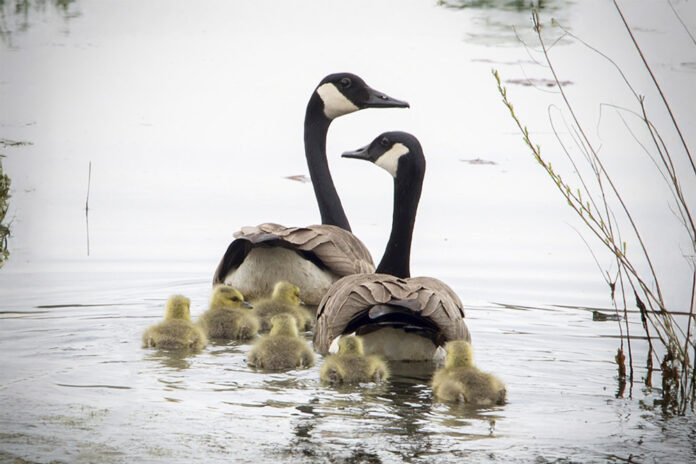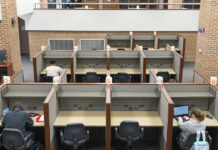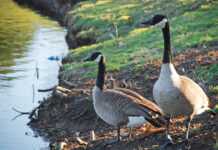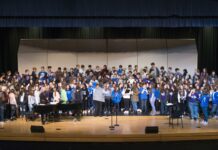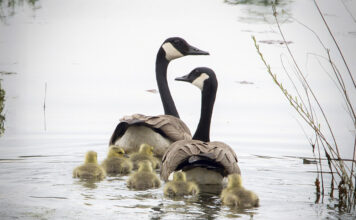On a crisp spring morning at Kellogg Community College, students dodge more than just deadlines.
All across the campus at 450 North Ave., a gaggle of Canada geese holds a loose formation across the sidewalk, honking, grazing and occasionally stopping traffic like winged crossing guards. It’s a familiar scene to many: The birds have returned.
Like clockwork, these geese descend on KCC’s Battle Creek campus each year, treating the neatly trimmed lawns and open sidewalks as their seasonal stomping grounds. For some, they’re a charming sign of spring. For others, they’re a feathery menace. But either way, the geese have become part of the KCC experience, prompting curiosity and caution among students and staff alike.
According to Sophia DiPietro, executive director of All Species Kinship (ASK), there’s a good reason these birds return to KCC each year, outside of the well-kept landscaping.
“Geese look for areas where they feel safe,” DiPietro says. “Many don’t actually ‘migrate’ in the way people think. Resident geese simply shift locations based on food sources and open water. In urban areas, they have fewer predators and have grown tolerant of humans in exchange for safety.”
KCC’s campus, with its open grassy areas and minimal threats, checks all the right boxes. And while it may seem like they vanish each winter and come flying back, some never leave at all.
“There are geese who remain at places like Irving Park all winter long, even when the ponds freeze,” DiPietro says. “They’re incredibly resilient and will hunker down in the smallest available water holes, especially if people continue to feed them.”
As long as communities like Battle Creek offer green spaces, food sources and relatively few natural predators, these birds are more likely to nest and raise their young in the same public spaces people use daily.
A study published in the Journal of Wildlife Management found that Canada goose nests in urban and commercial or industrial areas of New Jersey had significantly higher survival rates compared to those in rural or undeveloped landscapes. The researchers linked this success to the availability of manicured lawns, man-made ponds and a relative lack of predators, all features commonly found on college campuses like KCC.
That adaptability is part of a broader trend. Across North America, Canada geese have proven remarkably skilled at adjusting to urban environments. According to a 2022 study published in the journal Ecology and Evolution, some geese have even been documented nesting on rooftops in urban Indiana, behavior that highlights just how flexible they are when it comes to human-dominated spaces. Researchers point out that as long as cities offer safety, food and open water, these birds are likely to thrive and settle in, rather than simply pass through.
For students like Payton Karn, a second-year KCC student, the geese have become a seasonal fixture, but also a slight gamble in terms of personal space.
“I’ve been at KCC since 2022, and I do notice the geese returning each year,” she says. “My advice for new students would be to avoid them. Geese are evil, and I’m pretty sure they can bite – I’ve never gone close enough to find out!”
Humor aside, Karn admits the frequency of sightings depends a lot on where she’s spending her time.
“When I’m just at the Davidson building, I don’t really notice them as much. But when I have classes on main campus, they’re everywhere. And watch for goose poop – you’ll probably step in it.”
For Lauren Davis, who’s also been at KCC for two years, the geese are more than just background noise; they’re part of the culture.
“I would argue that the geese are entirely part of the culture, and not just for KCC, but the entire community of Battle Creek,” she says. “I see them every morning before work and every evening after classes. I just expect to see them now; it’s part of the routine.”
Even when they cause delays, like blocking roads or walkways, Davis says she takes it in stride.
“I’ve been late to class because there were geese in the road, but I’m a strong supporter of natural wildlife conservation. They add character, so I would say I’m pro-geese.”
Whether students love them or not, the Canada geese have claimed their place at KCC as reliably as the spring semester. With honks echoing across sidewalks and heads bobbing through the grass, they’re more than just seasonal visitors; they’re part of campus life. Some see them as pests, others as personality, but either way, they’ve become an unofficial mascot. They serve as a reminder that nature isn’t always out of sight, and sometimes, it’s right underfoot.
Just watch where you step between classes.



